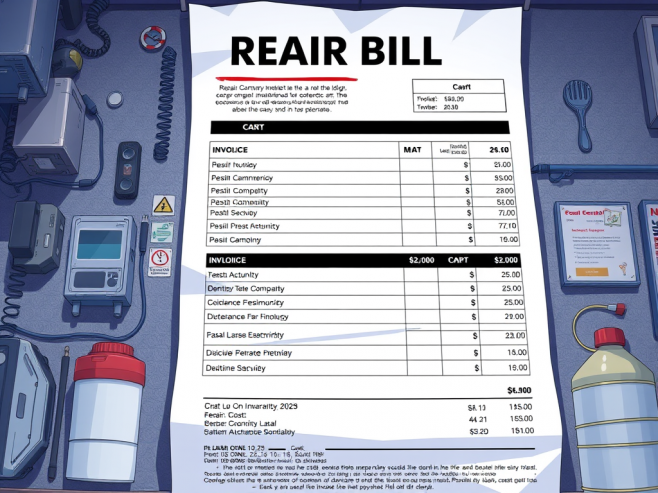Trending...
- Tacoma: At-Large City Council Member Olgy Diaz Hosts 'Bridging the Gap: Local Solutions in the Federal Landscape' on December 6
- The Patina Collective & Artist Jesse Draxler Debut "The Machine of Loving Grace"
- Signature Smiles Dental Group Unveils New User-Friendly Website
HVAC Philly, a leading Heating repair Philadelphia contractors, will explore some of the key reasons why Philly residents should consider making the switch.
PHILADELPHIA - Washingtoner -- Switching from an oil-based heating system to a natural gas one can be a significant decision for Philadelphia homeowners. While both methods keep homes warm during the city's cold winters, natural gas offers a number of compelling advantages. In this post, HVAC Philly, a leading Heating repair Philadelphia contractors, will explore some of the key reasons why Philly residents should consider making the switch.
Cost Savings
One of the most significant benefits of converting to natural gas is the potential for lower heating costs. The price of heating oil can be volatile and subject to market fluctuations, while natural gas prices are often more stable and generally lower. According to the U.S. Energy Information Administration, natural gas is consistently more affordable per BTU (British Thermal Unit) than heating oil. Over time, these savings can add up to a substantial amount, making a natural gas system a smart long-term investment.
Convenience and Reliability
More on Washingtoner
With an oil heating system, homeowners must regularly monitor their tank levels and schedule deliveries. This can be a hassle, especially during a cold snap when you might run out of oil unexpectedly. Natural gas, on the other hand, is delivered directly to your home through a reliable underground pipeline. This means you have a constant, uninterrupted supply of fuel, eliminating the need to worry about scheduling deliveries or running out of heat.
Environmental Benefits
Natural gas is a cleaner-burning fossil fuel than heating oil. It produces fewer greenhouse gas emissions, such as carbon dioxide, and significantly lower levels of sulfur dioxide and nitrogen oxides, which are contributors to acid rain and smog. By switching to natural gas, you can reduce your carbon footprint and contribute to a healthier environment for the Philadelphia community.
Increased Efficiency
Modern natural gas furnaces are highly efficient, with many models boasting efficiency ratings of 95% or higher. This means that a large majority of the fuel consumed is converted directly into heat for your home. Older oil furnaces, by contrast, are often far less efficient, meaning you're spending more money to heat your home with less effective results. A new, high-efficiency natural gas system can help you get the most out of every dollar you spend on heating.
More on Washingtoner
Safety
While both systems are safe when properly maintained, oil heating systems do come with a risk of oil leaks, which can be messy, expensive to clean up, and environmentally hazardous. Natural gas is a cleaner fuel, and modern systems have multiple safety features to detect leaks and shut off the gas supply.
Enhanced Home Value
A modern, efficient natural gas heating system can be an attractive feature for potential homebuyers. It signifies a home that has been updated and is ready for the future, potentially increasing its resale value.
The Conversion Process
Converting from an oil to a natural gas heating system is a project best handled by a qualified heater service Philadelphia professional. The process typically involves removing the old oil tank and furnace, installing a new gas furnace, and connecting the new system to the gas line. Philadelphia Gas Works (PGW) can assist homeowners with the process of getting a gas line to their home if one isn't already available.
Conclusion
For Philadelphia residents looking for a more cost-effective, convenient, and environmentally friendly way to heat their homes, converting from oil to natural gas is an excellent option. With lower costs, increased efficiency, and a reduced environmental impact.
For any type of Furnace repair Philadelphia residents trust HVAC Philly, and so should you.
Cost Savings
One of the most significant benefits of converting to natural gas is the potential for lower heating costs. The price of heating oil can be volatile and subject to market fluctuations, while natural gas prices are often more stable and generally lower. According to the U.S. Energy Information Administration, natural gas is consistently more affordable per BTU (British Thermal Unit) than heating oil. Over time, these savings can add up to a substantial amount, making a natural gas system a smart long-term investment.
Convenience and Reliability
More on Washingtoner
- UK Financial Ltd Announces A Special Board Meeting Today At 4PM: Orders MCAT Lock on CATEX, Adopts ERC-3643 Standard, & Cancels $0.20 MCOIN for $1
- Tacoma: City of Destiny Awards Nominations Accepted Now Through January 29, 2026
- Spokane: National Pearl Harbor Remembrance Day
- 6 Holiday Looks That Scream "Old Money" But Cost Less Than Your Christmas Tree
- FlintLab Announces Strategic Partnership with Genymotion
With an oil heating system, homeowners must regularly monitor their tank levels and schedule deliveries. This can be a hassle, especially during a cold snap when you might run out of oil unexpectedly. Natural gas, on the other hand, is delivered directly to your home through a reliable underground pipeline. This means you have a constant, uninterrupted supply of fuel, eliminating the need to worry about scheduling deliveries or running out of heat.
Environmental Benefits
Natural gas is a cleaner-burning fossil fuel than heating oil. It produces fewer greenhouse gas emissions, such as carbon dioxide, and significantly lower levels of sulfur dioxide and nitrogen oxides, which are contributors to acid rain and smog. By switching to natural gas, you can reduce your carbon footprint and contribute to a healthier environment for the Philadelphia community.
Increased Efficiency
Modern natural gas furnaces are highly efficient, with many models boasting efficiency ratings of 95% or higher. This means that a large majority of the fuel consumed is converted directly into heat for your home. Older oil furnaces, by contrast, are often far less efficient, meaning you're spending more money to heat your home with less effective results. A new, high-efficiency natural gas system can help you get the most out of every dollar you spend on heating.
More on Washingtoner
- From Cheer to Courtroom: The Hidden Legal Risks in Your Holiday Eggnog
- West Coast Hospitality Assumes Management of The Dundee Hotel
- Spokane: Council Member Paul Dillon Honored with Legislative Champion Award by We Train Washington
- Controversial Vegan Turns Rapper Launches First Song, "Psychopathic Tendencies."
- Inside the Fight for Affordable Housing: Avery Headley Joins Terran Lamp for a Candid Bronx Leadership Conversation
Safety
While both systems are safe when properly maintained, oil heating systems do come with a risk of oil leaks, which can be messy, expensive to clean up, and environmentally hazardous. Natural gas is a cleaner fuel, and modern systems have multiple safety features to detect leaks and shut off the gas supply.
Enhanced Home Value
A modern, efficient natural gas heating system can be an attractive feature for potential homebuyers. It signifies a home that has been updated and is ready for the future, potentially increasing its resale value.
The Conversion Process
Converting from an oil to a natural gas heating system is a project best handled by a qualified heater service Philadelphia professional. The process typically involves removing the old oil tank and furnace, installing a new gas furnace, and connecting the new system to the gas line. Philadelphia Gas Works (PGW) can assist homeowners with the process of getting a gas line to their home if one isn't already available.
Conclusion
For Philadelphia residents looking for a more cost-effective, convenient, and environmentally friendly way to heat their homes, converting from oil to natural gas is an excellent option. With lower costs, increased efficiency, and a reduced environmental impact.
For any type of Furnace repair Philadelphia residents trust HVAC Philly, and so should you.
Source: HVAC Philly Inc
0 Comments
Latest on Washingtoner
- Talagat Business Academy Announces Joint Certificate Program With The University of Chicago Booth School of Business
- LocaXion and Asseco CEIT Announce First-to-Market RTLS-Driven Digital Twin Platform for Healthcare, Manufacturing, and Logistics
- Slotozilla Launches New Report on How AI Is Reshaping Careers and Society
- Tacoma City Council Approves Tideflats Subarea Plan
- OKAVA Pharmaceuticals Announces First Cat Dosed in MEOW-1 Study of OKV-119, the World's First Clinical-Stage GLP-1 Weight-Loss Therapy for Pets
- Explosive Growth in U.S. Cryptocurrency Cloud Mining Sets The Stage for New Platform Launch with Daily Rewards in a Transparent Revenue-Share Model
- Qtex Cierra Ronda de $7 Millones para Estandarizar la Banca Transfronteriza en los Mercados Emergentes de Latinoamérica
- Boeing–Airbus Accreditation Breakdown: How "Probably" Certificates Created Worldwide Risk
- Spokane: Suspect in Custody After Shooting Leaves One Subject Deceased
- America's Most Festive Garages Wanted for Garage.com's 2025 Holiday Contest
- Spokane: Funding Available for Culturally Specific Treatment of Opioid Use Disorder Grants
- FDA Accepts ANDA for KETAFREE™ as Analyst Sets $34 Price Target for NRx Pharmaceuticals: (N A S D A Q : NRXP) NRx is Poised for a massive Breakthrough
- BEC Technologies Expands MX-220 5G Industrial Router Series for Edge Connectivity
- "Latino Leaders Speak: Personal Stories of Struggle and Triumph, Volume II" Documents the Truth About Latino Excellence and Impact on American Society
- Broadway Smile Boutique Unveils Modern Website for Enhanced Patient Experience
- Fenix Consulting Group Expands Orange County Office to Meet Growing Client Demand
- Signature Smiles Dental Group Unveils New User-Friendly Website
- CCHR: New Data Shows Millions of U.S. Children Caught in Escalating Psychiatric Polypharmacy
- QwickContractReview.com Launches $19 Contract Review Service to Protect Consumers from Hidden Contract Risks
- Tacoma: At-Large City Council Member Olgy Diaz Hosts 'Bridging the Gap: Local Solutions in the Federal Landscape' on December 6





